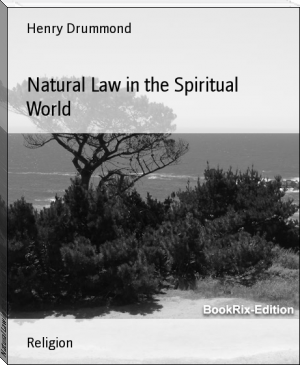Natural Law in the Spiritual World - Henry Drummond (feel good novels txt) 📗

- Author: Henry Drummond
Book online «Natural Law in the Spiritual World - Henry Drummond (feel good novels txt) 📗». Author Henry Drummond
includes not only forgiveness of sin but salvation or deliverance from the downward bias of the soul. It takes in that whole process of rescue from the power of sin and selfishness that should be going on from day to day in every human life. We have seen that there is a natural principle in man lowering him, deadening him, pulling him down by inches to the mere animal plane, blinding reason, searing conscience, paralyzing will. This is the active destroying principle, or Sin. Now to counteract this, God has discovered to us another principle which will stop this drifting process in the soul, steer it round, and make it drift the other way. This is the active saving principle, or Salvation. If a man find the first of these powers furiously at work within him, dragging his whole life downward to destruction, there is only one way to escape his fate--to take resolute hold of the upward power, and be borne by it to the opposite goal. And as this second power is the only one in the universe which has the slightest real effect upon the first, how shall a man escape if he neglect it? To neglect it is to cut off the only possible chance of escape. In declining this he is simply abandoning himself with his eyes open to that other and terrible energy which is already there, and which, in the natural course of things, is bearing him every moment further and further from escape.
From the very nature of Salvation, therefore, it is plain that the only thing necessary to make it of no effect is neglect. Hence the Bible could not fail to lay strong emphasis on a word so vital. It was not necessary for it to say, how shall we escape if we trample upon the great salvation, or doubt, or despise, or reject it. A man who has been poisoned only need neglect the antidote and he will die. It makes no difference whether he dashes it on the ground, or pours it out of the window, or sets it down by his bedside, and stares at it all the time he is dying. He will die just the same, whether he destroys it in a passion, or coolly refuses to have anything to do with it. And as a matter of fact probably most deaths, spiritually, are gradual dissolutions of the last class rather than rash suicides of the first.
This, then, is the effect of neglecting salvation from the side of salvation itself; and the conclusion is that from the very nature of salvation escape is out of the question. Salvation is a definite process. If a man refuse to submit himself to that process, clearly he cannot have the benefits of it. _As many as received Him to them gave He_ power _to become the sons of God._ He does not avail himself of this power. It may be mere carelessness or apathy. Nevertheless the neglect is fatal. He cannot escape because he will not.
Turn now to another aspect of the case--to the effect upon the soul itself. Neglect does more for the soul than make it miss salvation. It despoils it of its capacity for salvation. Degeneration in the spiritual sphere involves primarily the impairing of the faculties of salvation and ultimately the loss of them. It really means that the very soul itself becomes piecemeal destroyed until the very capacity for God and righteousness is gone.
The soul, in its highest sense, is a vast capacity for God. It is like a curious chamber added on to being, and somehow involving being, a chamber with elastic and contractile walls, which can be expanded, with God as its guest, illimitably, but which without God shrinks and shrivels until every vestige of the Divine is gone, and God's image is left without God's Spirit. One cannot call what is left a soul; it is a shrunken, useless organ, a capacity sentenced to death by disuse, which droops as a withered hand by the side, and cumbers nature like a rotted branch. Nature has her revenge upon neglect as well as upon extravagance. Misuse, with her, is as mortal a sin as abuse.
There are certain burrowing animals--the mole for instance--which have taken to spending their lives beneath the surface of the ground. And Nature has taken her revenge upon them in a thoroughly natural way--she has closed up their eyes. If they mean to live in darkness, she argues, eyes are obviously a superfluous function. By neglecting them these animals made it clear they do not want them. And as one of Nature's fixed principles is that nothing shall exist in vain, the eyes are presently taken away, or reduced to a rudimentary state. There are fishes also which have had to pay the same terrible forfeit for having made their abode in dark caverns where eyes can never be required. And in exactly the same way the spiritual eye must die and lose its power by purely natural law if the soul choose to walk in darkness rather than in light.
This is the meaning of the favorite paradox of Christ, "From him that hath not shall be taken away even that which he hath;" "take therefore the talent from him." The religious faculty is a talent, the most splendid and sacred talent we possess. Yet it is subject to the natural conditions and laws. If any man take his talent and hide it in a napkin, although it is doing him neither harm nor good apparently, God will not allow him to have it. Although it is lying there rolled up in the darkness, not conspicuously affecting any one, still God will not allow him to keep it. He will not allow him to keep it any more than Nature would allow the fish to keep their eyes. Therefore, He says, "take the talent from him." And Nature does it.
This man's crime was simply neglect--"thou wicked and _slothful_ servant." It was a wasted life--a life which failed in the holy stewardship of itself. Such a life is a peril to all who cross its path. Degeneration compasses Degeneration. It is only a character which is itself developing that can aid the Evolution of the world and so fulfill the end of life. For this high usury each of our lives, however small may seem our capital, was given us by God. And it is just the men whose capital seems small who need to choose the best investments. It is significant that it was the man who had only one talent who was guilty of neglecting it. Men with ten talents, men of large gifts and burning energies, either direct their powers nobly and usefully, or misdirect them irretrievably. It is those who belong to the rank and file of life who need this warning most. Others have an abundant store and sow to the spirit or the flesh with a lavish hand. But we, with our small gift, what boots our sowing? Our temptation as ordinary men is to neglect to sow at all. The interest on our talent would be so small that we excuse ourselves with the reflection that it is not worth while.
It is no objection to all this to say that we are unconscious of this neglect or misdirection of our powers. That is the darkest feature in the case. If there were uneasiness there might be hope. If there were, somewhere about our soul, a something which was not gone to sleep like all the rest; if there were a contending force anywhere; if we would let even that work instead of neglecting it, it would gain strength from hour to hour, and waken up one at a time each torpid and dishonored faculty till our whole nature became alive with strivings against self, and every avenue was open wide for God. But the apathy, the numbness of the soul, what can be said of such a symptom but that it means the creeping on of death? There are accidents in which the victims feel no pain. They are well and strong they think. But they are dying. And if you ask the surgeon by their side what makes him give this verdict, he will say it is this numbness over the frame which tells how some of the parts have lost already the very capacity for life.
Nor is it the least tragic accompaniment of this process that its effects may even be concealed from others. The soul undergoing Degeneration, surely by some arrangement with Temptation planned in the uttermost hell, possesses the power of absolute secrecy. When all within is festering decay and rottenness, a Judas, without anomaly, may kiss his Lord. This invisible consumption, like its fell analogue in the natural world, may even keep its victim beautiful while slowly slaying it. When one examines the little _Crustacea_ which have inhabited for centuries the lakes of the Mammoth Cave of Kentucky, one is at first astonished to find these animals apparently endowed with perfect eyes. The pallor of the head is broken by two black pigment specks, conspicuous indeed as the only bits of color on the whole blanched body; and these, even to the casual observer, certainly represent well-defined organs of vision. But what do they with eyes in these Stygian waters? There reigns an everlasting night. Is the law for once at fault? A swift incision with the scalpel, a glance with a lens, and their secret is betrayed. The eyes are a mockery. Externally they are organs of vision--the front of the eye is perfect; behind, there is nothing but a mass of ruins. The optic nerve is a shrunken, atrophied and insensate thread. These animals have organs of vision, and yet they have no vision. They have eyes, but they see not.
Exactly what Christ said of men: They had eyes, but no vision. And the reason is the same. It is the simplest problem of natural history. The _Crustacea_ of the Mammoth Cave have chosen to abide in darkness. Therefore they have become fitted for it. By refusing to see they have waived the right to see. And Nature has grimly humored them. Nature had to do it by her very constitution. It is her defence against waste that decay of faculty should immediately follow disuse of function. He that hath ears to hear, he whose ears have not degenerated, let him hear.
Men tell us sometimes there is no such thing as an atheist. There must be. There are some men to whom it is true that there is no God. They cannot see God because they have no eye. They have only an abortive organ, atrophied by neglect.
All this, it is commonplace again to insist, is not the effect of neglect when we die, but while we live. The process is in full career and operation now. It is useless projecting consequences into the future when the effects may be measured now. We are always practicing these little deceptions upon ourselves, postponing the consequences of our misdeeds as if they were to culminate some other day about the time of death. It makes us sin with a lighter hand to run an account with retribution, as it were, and delay the reckoning time with God. But every day is a reckoning day. Every soul is a Book of Judgment and Nature, as a recording angel, marks there every sin. As all will be judged by the great Judge some day, all are judged by Nature now. The sin of yesterday, as part of its penalty, has the sin of to-day. All follow us in silent retribution on our past, and go with us to the grave. We cannot cheat Nature. No sleight-of-heart can rob religion of _a present_, the immortal nature of
From the very nature of Salvation, therefore, it is plain that the only thing necessary to make it of no effect is neglect. Hence the Bible could not fail to lay strong emphasis on a word so vital. It was not necessary for it to say, how shall we escape if we trample upon the great salvation, or doubt, or despise, or reject it. A man who has been poisoned only need neglect the antidote and he will die. It makes no difference whether he dashes it on the ground, or pours it out of the window, or sets it down by his bedside, and stares at it all the time he is dying. He will die just the same, whether he destroys it in a passion, or coolly refuses to have anything to do with it. And as a matter of fact probably most deaths, spiritually, are gradual dissolutions of the last class rather than rash suicides of the first.
This, then, is the effect of neglecting salvation from the side of salvation itself; and the conclusion is that from the very nature of salvation escape is out of the question. Salvation is a definite process. If a man refuse to submit himself to that process, clearly he cannot have the benefits of it. _As many as received Him to them gave He_ power _to become the sons of God._ He does not avail himself of this power. It may be mere carelessness or apathy. Nevertheless the neglect is fatal. He cannot escape because he will not.
Turn now to another aspect of the case--to the effect upon the soul itself. Neglect does more for the soul than make it miss salvation. It despoils it of its capacity for salvation. Degeneration in the spiritual sphere involves primarily the impairing of the faculties of salvation and ultimately the loss of them. It really means that the very soul itself becomes piecemeal destroyed until the very capacity for God and righteousness is gone.
The soul, in its highest sense, is a vast capacity for God. It is like a curious chamber added on to being, and somehow involving being, a chamber with elastic and contractile walls, which can be expanded, with God as its guest, illimitably, but which without God shrinks and shrivels until every vestige of the Divine is gone, and God's image is left without God's Spirit. One cannot call what is left a soul; it is a shrunken, useless organ, a capacity sentenced to death by disuse, which droops as a withered hand by the side, and cumbers nature like a rotted branch. Nature has her revenge upon neglect as well as upon extravagance. Misuse, with her, is as mortal a sin as abuse.
There are certain burrowing animals--the mole for instance--which have taken to spending their lives beneath the surface of the ground. And Nature has taken her revenge upon them in a thoroughly natural way--she has closed up their eyes. If they mean to live in darkness, she argues, eyes are obviously a superfluous function. By neglecting them these animals made it clear they do not want them. And as one of Nature's fixed principles is that nothing shall exist in vain, the eyes are presently taken away, or reduced to a rudimentary state. There are fishes also which have had to pay the same terrible forfeit for having made their abode in dark caverns where eyes can never be required. And in exactly the same way the spiritual eye must die and lose its power by purely natural law if the soul choose to walk in darkness rather than in light.
This is the meaning of the favorite paradox of Christ, "From him that hath not shall be taken away even that which he hath;" "take therefore the talent from him." The religious faculty is a talent, the most splendid and sacred talent we possess. Yet it is subject to the natural conditions and laws. If any man take his talent and hide it in a napkin, although it is doing him neither harm nor good apparently, God will not allow him to have it. Although it is lying there rolled up in the darkness, not conspicuously affecting any one, still God will not allow him to keep it. He will not allow him to keep it any more than Nature would allow the fish to keep their eyes. Therefore, He says, "take the talent from him." And Nature does it.
This man's crime was simply neglect--"thou wicked and _slothful_ servant." It was a wasted life--a life which failed in the holy stewardship of itself. Such a life is a peril to all who cross its path. Degeneration compasses Degeneration. It is only a character which is itself developing that can aid the Evolution of the world and so fulfill the end of life. For this high usury each of our lives, however small may seem our capital, was given us by God. And it is just the men whose capital seems small who need to choose the best investments. It is significant that it was the man who had only one talent who was guilty of neglecting it. Men with ten talents, men of large gifts and burning energies, either direct their powers nobly and usefully, or misdirect them irretrievably. It is those who belong to the rank and file of life who need this warning most. Others have an abundant store and sow to the spirit or the flesh with a lavish hand. But we, with our small gift, what boots our sowing? Our temptation as ordinary men is to neglect to sow at all. The interest on our talent would be so small that we excuse ourselves with the reflection that it is not worth while.
It is no objection to all this to say that we are unconscious of this neglect or misdirection of our powers. That is the darkest feature in the case. If there were uneasiness there might be hope. If there were, somewhere about our soul, a something which was not gone to sleep like all the rest; if there were a contending force anywhere; if we would let even that work instead of neglecting it, it would gain strength from hour to hour, and waken up one at a time each torpid and dishonored faculty till our whole nature became alive with strivings against self, and every avenue was open wide for God. But the apathy, the numbness of the soul, what can be said of such a symptom but that it means the creeping on of death? There are accidents in which the victims feel no pain. They are well and strong they think. But they are dying. And if you ask the surgeon by their side what makes him give this verdict, he will say it is this numbness over the frame which tells how some of the parts have lost already the very capacity for life.
Nor is it the least tragic accompaniment of this process that its effects may even be concealed from others. The soul undergoing Degeneration, surely by some arrangement with Temptation planned in the uttermost hell, possesses the power of absolute secrecy. When all within is festering decay and rottenness, a Judas, without anomaly, may kiss his Lord. This invisible consumption, like its fell analogue in the natural world, may even keep its victim beautiful while slowly slaying it. When one examines the little _Crustacea_ which have inhabited for centuries the lakes of the Mammoth Cave of Kentucky, one is at first astonished to find these animals apparently endowed with perfect eyes. The pallor of the head is broken by two black pigment specks, conspicuous indeed as the only bits of color on the whole blanched body; and these, even to the casual observer, certainly represent well-defined organs of vision. But what do they with eyes in these Stygian waters? There reigns an everlasting night. Is the law for once at fault? A swift incision with the scalpel, a glance with a lens, and their secret is betrayed. The eyes are a mockery. Externally they are organs of vision--the front of the eye is perfect; behind, there is nothing but a mass of ruins. The optic nerve is a shrunken, atrophied and insensate thread. These animals have organs of vision, and yet they have no vision. They have eyes, but they see not.
Exactly what Christ said of men: They had eyes, but no vision. And the reason is the same. It is the simplest problem of natural history. The _Crustacea_ of the Mammoth Cave have chosen to abide in darkness. Therefore they have become fitted for it. By refusing to see they have waived the right to see. And Nature has grimly humored them. Nature had to do it by her very constitution. It is her defence against waste that decay of faculty should immediately follow disuse of function. He that hath ears to hear, he whose ears have not degenerated, let him hear.
Men tell us sometimes there is no such thing as an atheist. There must be. There are some men to whom it is true that there is no God. They cannot see God because they have no eye. They have only an abortive organ, atrophied by neglect.
All this, it is commonplace again to insist, is not the effect of neglect when we die, but while we live. The process is in full career and operation now. It is useless projecting consequences into the future when the effects may be measured now. We are always practicing these little deceptions upon ourselves, postponing the consequences of our misdeeds as if they were to culminate some other day about the time of death. It makes us sin with a lighter hand to run an account with retribution, as it were, and delay the reckoning time with God. But every day is a reckoning day. Every soul is a Book of Judgment and Nature, as a recording angel, marks there every sin. As all will be judged by the great Judge some day, all are judged by Nature now. The sin of yesterday, as part of its penalty, has the sin of to-day. All follow us in silent retribution on our past, and go with us to the grave. We cannot cheat Nature. No sleight-of-heart can rob religion of _a present_, the immortal nature of
Free e-book «Natural Law in the Spiritual World - Henry Drummond (feel good novels txt) 📗» - read online now
Similar e-books:





Comments (0)